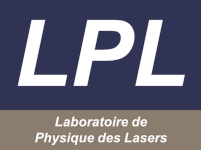Post: Master Internship in ultra-precise mid-infrared molecular spectroscopy
Location: Laboratoire de Physique des Lasers (LPL), CNRS-Univ Sorbonne Paris Nord, Villetaneuse, France
Team: Metrology, Molecules and Fundamental Tests (MMFT)
Advisors: Dr Mathieu Manceau, Dr Benoît Darquié
Contract: Fixed Term, 4-6 months, starting in Spring 2024
You will find the job description here
Internship description:
Ultra-high resolution molecular spectroscopy is an interdisciplinary field with fascinating applications ranging from fundamental physics to astrophysics, earth sciences, remote sensing, metrology and quantum technologies. Among recent instrumental advances, the stabilization of quantum cascade lasers (QCLs) on optical frequency combs with traceability to primary frequency standards, a method recently implemented in our team, is a breakthrough technology. It offers an unprecedented level of precision in the mid-infrared, an essential region known as the molecular fingerprint region, which hosts a considerable number of intense vibrational signatures of molecules of various interests. This opens up prospects for carrying out fundamental physics tests and exploring the limits of the Standard Model (testing fundamental symmetries, measuring fundamental constants or their variations, searching for dark matter, etc.), and for providing precise spectroscopic data on species of astrophysical or atmospheric interest, which is a crucial information for environmental and human health issues.
We have for instance recently measured rovibrational frequencies in methanol with 11-digits accuracy by carrying out saturated absorption spectroscopy in a multi-pass cell and in a Fabry-Perot cavity enhanced spectroscopy, a more than 4 orders of magnitude improvement compared to previous measurements reported in the literature.
The master student will take an active role in various aspects of the experiment in order to improve our setup and to allow us to target more complex molecules of atmospheric, astrophysics and fundamental interest. She/he will:
– improve our current signal-to-noise ratio and spectroscopic resolution and assess the corresponding progress;
– perform sub-Doppler measurements on methanol (CH3OH) at record precision and identify transitions relevant for testing the variation of fundamental constants such as the proton-to-electron mass ratio;
– perform precise spectroscopic measurements on increasingly complex molecular systems of interest for atmospheric sciences (dimethyl sulphide, CH3SCH3), astrophysics (trioxane, C3H6O3), and for probing the violation of fundamental symmetries (chiral organo-metallic species).
The proposed technology is at the forefront of time-frequency metrology and bring increasingly complex polyatomic molecular systems within reach of precision measurement experiments and frequency metrology. It has also strong potential applicative and industrial perspectives, for example in medical diagnosis, detection of pollutants, hazardous materials or quantum technologies.
Keywords:
ultra-high resolution vibrational spectroscopy, mid-infrared, frequency metrology, Doppler-free methods, precision measurements, optical frequency comb lasers, quantum cascade lasers, molecular physics, quantum physics, optics and lasers, vacuum techniques, electronics, programming and simulation
Relevant publications from the team:
Cahuzac et al, European Frequency and Time Forum 2022, hal-03861460; Fiechter et al, J Phys Chem Lett 13, 42 (2022); Santagata et al, Optica 6, 411 (2019); Argence et al, Nature Photon. 9, 456 (2015), arXiv:1412.2207.
Requirements:
The applicant should be doing its master studies in a relevant area of experimental physics or chemical physics: atomic, molecular and optical physics, spectroscopy, lasers, quantum optics. Interested applicants should email a CV, a brief description of research interests and the contact details of 2 referents to B. Darquié and/or M. Manceau.
Possibility of continuing with a thesis, funding is already secured
